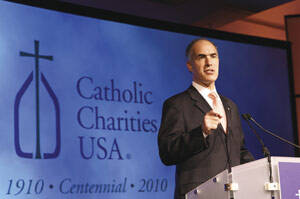Recent data from the U.S. Census Bureau on escalating poverty shocked many. The 2009 figures indicated a reversal of national progress on hunger and want. Almost 44 million Americans now live below the poverty line ($22,050 for a family of four), and 21 percent of all U.S. children—up from 16 percent just 10 years ago—are growing up poor. The depressing statistics were enough to engage the attention of newspaper editorial writers around the country, but so far they have not inspired much discussion among U.S. policymakers.
“To be honest, we’re not talking about this in Washington,” said Representative James McGovern, Democrat of Massachusetts. “We’re arguing about extending tax cuts for the rich or extending tax cuts for the middle class. The reality is that for a lot of people in this country, that debate is completely irrelevant.”
Representative McGovern, along with Pennsylvania’s Senator Bob Casey, a Democrat, introduced new legislation on Sept. 28 meant to redirect the Congressional conversation toward the nuts and bolts of a renewed national effort toward poverty reduction. The National Opportunity and Community Renewal Act was crafted with the help of Catholic Charities USA, capturing what its staff has learned from antipoverty campaigners around the country in a legislative package meant to modernize and invigorate the national response to poverty. The act calls for revisions not just in the way poverty and want are measured in the United States, using a system that was an innovation in 1963, but also in how antipoverty efforts are financed and executed at the local level. The legislation replaces income and food-basket measurements of poverty with a comprehensive “human development index,” an easy-to-understand measure that tracks overall well-being in health, education and income.
Candy Hill, Catholic Charities USA’s senior vice president for social policy and government affairs, said the legislation would create pilot antipoverty programs around the country, waiving federal regulations that discourage local innovation. Comprehensive “individual opportunity plans,” modeled after “individual education plans” familiar to parents of children with special needs, would replace standardized national antipoverty strategies. Persons and families attempting to emerge from poverty could take advantage of holistic plans designed specifically for their circumstances, obstacles and opportunities. If the pilots prove successful, the legislation could end the one-size-fits-all approach that has typified national antipoverty campaigns.
Hill has no delusions about the likelihood of quick passage for the Catholic Charities-inspired legislation anytime soon. She called it a “marker,” “starter legislation” meant to get the topic of poverty reduction back into the national spotlight. She feared the nation’s economic preoccupations might otherwise keep the worsening problem of poverty too long off the public agenda, with devastating effect on the nation’s poor and vulnerable. “We can’t continue to do this work the way we are doing it,” she said. “We don’t have the resources we need, and we’re heading in the wrong direction.”
“As a country we need to have a conversation about this,” Hill said. “We have more people living in poverty than we’ve had in decades.” If the nation does not respond now, Hill warned, antipoverty gains could be terminally set back. “We don’t want to see another decade slip past and have more people left out.”








